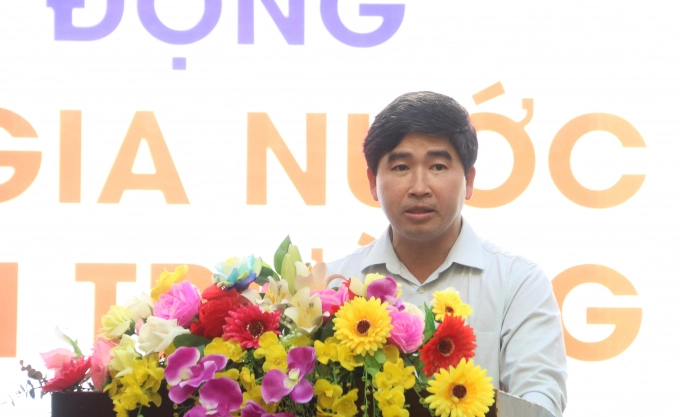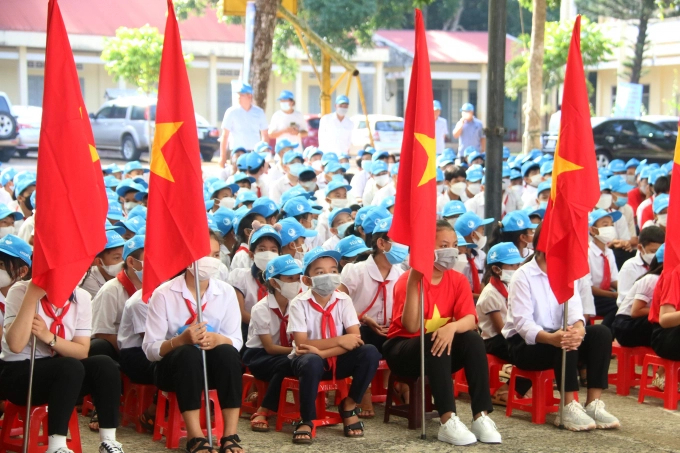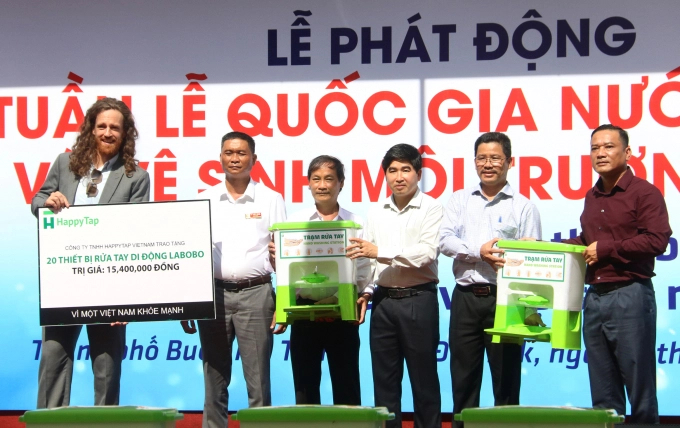June 21, 2025 | 03:00 GMT +7
June 21, 2025 | 03:00 GMT +7
Hotline: 0913.378.918
June 21, 2025 | 03:00 GMT +7
Hotline: 0913.378.918
On the morning of May 13, MARD coordinated with the People's Committee of Dak Lak province and the United Nations Children's Fund to launch a response to the National Week of Clean Water and Sanitation 2022 in Buon Ma Thuot City. The ceremony was attended by Mr. Luong Van Anh, Deputy Director of the General Directorate of Water Resources and other Departments and Offices under MARD. Regarding the local government, Mr. Y Giang Gry Nie Knong, Vice Chairman of Dak Lak Provincial People's Committee was the representative.
The National Water and Sanitation Week 2022 is themed 'Sustainable management, operation and exploitation of water supply and rural sanitation works'. The event anticipates that each person will join hands in environment preservation; protect and use water resources economically and efficiently, encourage good personal hygiene practices to minimize negative impacts on public health; and simultaneously implement sustainable development of clean water and environmental sanitation nationwide.
Clean water is one of the factors that ensure the survival and growth of life on earth, an important factor determining the development of the nation. In other words, clean water accompanies the development of humanity.

Mr. Luong Van Anh, Deputy Director of the General Directorate of Water Resources, spoke at the ceremony. Photo: Quang Yen.
In recent years, the issue of clean water and rural environmental sanitation has always been a Government concern, actively and positively responded by local authorities and people to the implementation. Approved National Target Program on Clean Water and Rural Environment for the period 2000-2015, The National Target Program on New Rural Construction, programs and projects on rural clean water and sanitation have basically achieved set targets.
By the end of 2021, the rate of rural people using hygienic water remained at about 90%; 54% of the water used met QCVN; 94% of rural households own latrines (76% own hygienic latrines); 96% of schools and health stations are equipped with water supply and sanitation facilities.
Speaking at the launching ceremony, Mr. Luong Van Anh, Deputy Director of the General Directorate of Water Resources stated that, despite many achievements in rural water supply and sanitation, there were also many challenges and difficulties to overcome.

Students participated in the response to the ceremony. Photo: Quang Yen.
Specifically, many concentrated water supply infrastructures created in previous stages were degraded, damaged or stopped working; The percentage of people in rural areas using small-scale household water supply is as high as nearly 56%, posing potential risks to people's health due to pollution from water sources; propagation effectiveness is still limited, unable to create breakthrough changes in awareness and action in water resource protection and in the role of clean water to public health, preservation and protection of water supply infrastructures, the practice of personal hygiene behaviors and the keeping of public environmental hygiene.
According to Mr. Luong Van Anh, in the upcoming time, all levels and branches need to develop and complete legal documents on rural clean water work; benchmarks, and develop standards on rural water supply and sanitation in order to further promote the participation of all economic sectors in investment, management and exploitation of water supply infrastructures; simplifying procedures as well as the initiative for the locality and the responsibility of the service provider to the quality of the service they provide.
Sectors need to proactively allocate resources to combine and integrate programs and projects on rural water supply and sanitation at the Central and local levels. Prioritize implementation to meet rural water supply and sanitation targets in The National Target Program on New Rural Construction and in difficult economic zones in remote areas.

Leaders attended the ceremony to donate hand washing equipment to schools in Buon Ma Thuot city. Photo: Quang Yen.
In particular, localities need to strengthen the management, operation and sustainable exploitation of rural water supply and sanitation infrastructures to ensure their sustainability, elevate the effect of investment capital, and assist people in using safe water sources for health protection and disease prevention. Promote communication to change people's awareness of using clean water and hygienic latrines.
The National Week of Clean Water and Sanitation launched by the Prime Minister takes place from April 29 to May 6 every year; along with World Water Day (March 22), Vietnam's traditional day for natural disaster prevention and control, May 22, and World Environment Day (June 5).
Translated by Hoang Duy
![Turning wind and rain into action: [9] Digitizing hydrometeorological data in response to climate change](https://t.ex-cdn.com/nongnghiepmoitruong.vn/608w/files/news/2025/06/17/z6704423696987_15fd32ffc26d590d204d520c9dac6786-nongnghiep-165943.jpg)
(VAN) Farmers have begun accessing hydrometeorological applications to adjust their cropping schedules, aiming to ensure productivity and adapt to climate change.
![Turning wind and rain into action: [8] Real-time salinity detection and early warning technology](https://t.ex-cdn.com/nongnghiepmoitruong.vn/608w/files/news/2025/06/17/z6704423696987_15fd32ffc26d590d204d520c9dac6786-nongnghiep-151127.jpg)
(VAN) Thanks to the integration of modern hydrological-hydraulic models, remote sensing technologies, and artificial intelligence, the accuracy of hydrological forecasting has significantly improved.
![Turning wind and rain into action: [7] Early disaster warnings help marine farmers minimize losses](https://t.ex-cdn.com/nongnghiepmoitruong.vn/608w/files/news/2025/06/17/z6704423696987_15fd32ffc26d590d204d520c9dac6786-nongnghiep-142942.jpg)
(VAN) In recent years, thanks to early disaster warnings and forecasting, marine farmers in Khanh Hoa province have been able to reduce risks and losses, thereby improving production efficiency.
![Turning wind and rain into action: [6] ‘Four on-the-spot’ disaster management software](https://t.ex-cdn.com/nongnghiepmoitruong.vn/608w/files/news/2025/06/17/e5a48259d6a262fc3bb3-nongnghiep-183800.jpg)
(VAN) By simply activating the scenario on the disaster management software, the relevant authorities immediately know how many households need to be evacuated, where to evacuate them to, and by what means of transportation…
![Turning wind and rain into action: [5] Hue applies modern technology in disaster forecasting](https://t.ex-cdn.com/nongnghiepmoitruong.vn/608w/files/news/2025/06/17/z6704423696987_15fd32ffc26d590d204d520c9dac6786-nongnghiep-093938.jpg)
(VAN) In Hue city, modern technology has recently been applied in meteorological and hydrological forecasting and warning, helping to reduce the damage caused by natural disasters.

(VAN) A cutting-edge farming technique being implemented on an experimental ranch in Arizona's Sonoran Desert has already saved a billion gallons of water over five years, according to Civil Eats.

(VAN) Poultry and pig production and the environment can be boosted through enhanced water technology, according to new research.